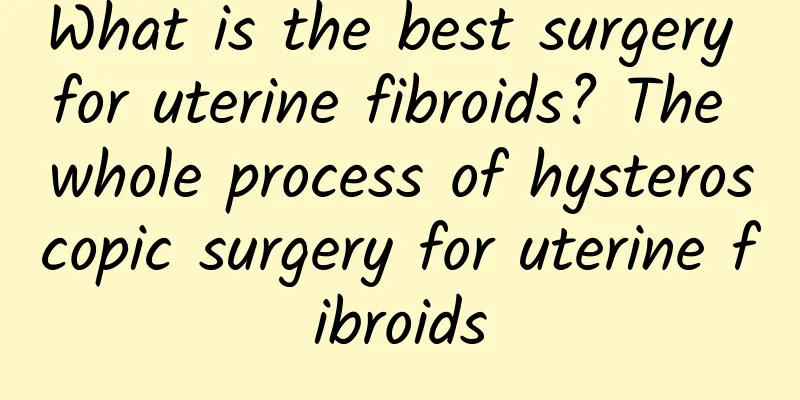What is the best surgery for uterine fibroids? The whole process of hysteroscopic surgery for uterine fibroids

|
What surgery is best for uterine fibroids? Uterine fibroids are a common benign tumor in women. Once detected, they often require surgical treatment. So, what is the best surgery for uterine fibroids? At present, hysteroscopic surgery is a more recommended option. The following will introduce the whole process of hysteroscopic surgery in detail. 1. Preoperative preparation Before hysteroscopic surgery, a series of preoperative preparations are required. First, the doctor needs to conduct a comprehensive assessment of the condition to ensure the feasibility of the surgery. Secondly, some examinations, such as B-ultrasound and pathological examination, are required to determine the nature and size of the fibroids. Finally, the patient needs to stop menstruating in advance so that the surgery can proceed smoothly. 2. Surgical Procedure Hysteroscopic surgery is a minimally invasive surgery that uses a laparoscope to introduce instruments into the uterus and directly act on the fibroids. The surgery is generally divided into the following steps: 1. Anesthesia: Before the operation begins, the patient will receive anesthesia, usually general anesthesia or spinal anesthesia. 2. Introduction of instruments: After anesthesia, the doctor will introduce the hysteroscope and other surgical instruments through the abdominal puncture point. 3. Observe the uterine cavity: The doctor will use hysteroscopy to observe the situation inside the uterus and determine the location and size of the fibroids. 4. Resection of fibroids: Using a knife introduced through the hysteroscope, the doctor removes or cuts open the fibroids to shrink or eliminate them. 5. Coagulation and hemostasis: After the operation, the doctor will use specific instruments to coagulate and stop bleeding to avoid postoperative bleeding. 6. End of the operation: After the operation, the doctor will remove the surgical instruments, treat the wound, and suture the wound. 3. Postoperative Care After surgery, patients need to do some necessary postoperative care to promote recovery and reduce the risk of complications: 1. Control bleeding: After the operation, the patient may have mild bleeding, which requires careful observation. At the same time, avoid strenuous exercise and excessive fatigue to control bleeding. 2. Restrained rest: For a period of time after surgery, the patient needs to rest properly and avoid excessive fatigue to help the wound heal faster. 3. Standardized diet: The diet after surgery needs to be standardized. Eat more easily digestible foods and avoid irritating foods to reduce the burden on the gastrointestinal tract. In summary, hysteroscopic surgery is currently a recommended treatment for uterine fibroids. Through hysteroscopic surgery, the situation inside the uterus can be accurately observed, and the fibroids can be removed or cut in a targeted manner. The postoperative recovery is fast and the trauma is small. Of course, whether the surgery is suitable depends on the specific situation of the patient. Before the operation, it is recommended that the patient fully communicate with the doctor to understand the specific risks and effects of the operation and make a more informed choice. |
>>: What causes uterine fibroids? What should an unmarried girl do if she has uterine fibroids?
Recommend
How long after a miscarriage can I eat apples? Can I slightly heat them?
After an abortion, you must arrange your diet wel...
How much does it cost to cure threatened abortion?
In the early stages of pregnancy, due to accident...
Housewives' Union: Stop importing American beef, zero detection of clenbuterol
The issue of ractopamine has once again caused a ...
What are the causes and symptoms of female vulvar leukoplakia?
Usually, the cause of vulvar leukoplakia is mainl...
Can endometrial tuberculosis be completely cured?
Generally speaking, Western medicine treats endom...
What are the tests for vaginitis?
What are the tests for vaginitis? Generally speak...
What medicine is good for irregular menstruation
What medicine should I take for irregular menstru...
Why do some people have the capital to be obese? Do some people suffer from chronic diseases once they become obese?
Obesity is a common disease of civilization among...
How to treat female cervical erosion? Recommend several treatment methods for cervical erosion
How to treat cervical erosion? Irregular vaginal ...
How long does it take to get pregnant after laparoscopic surgery for ectopic pregnancy
After laparoscopic surgery for ectopic pregnancy,...
Which one is better for weight loss, red apple or green apple? Hou Wenyi's nutritionist reveals: These three groups should not eat too many apples
With the arrival of summer, many women begin to a...
Questions about threatened miscarriage
Nowadays, society emphasizes gender equality, all...
There are 3 treatments for chronic adnexitis:
Chronic adnexitis refers to inflammation involvin...
What are the symptoms and treatment of ovarian cysts?
What are the symptoms of ovarian cysts? How are t...
Can chronic cervicitis be completely cured? Pay attention to 6 things when treating chronic cervicitis
In life, every woman wants to be healthy. Cervici...









